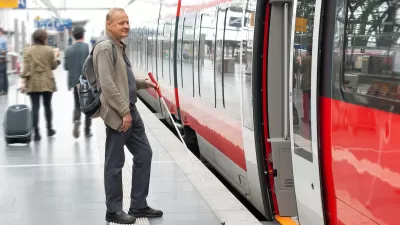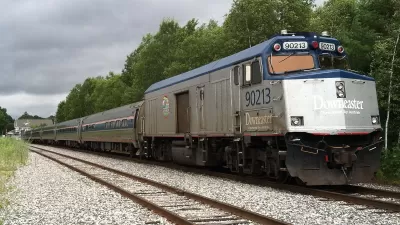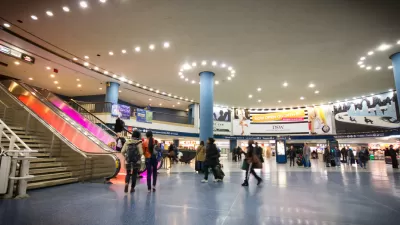With more than a quarter of disabled Americans who are unable to leave their homes prevented from doing so by transportation difficulties, Sarah Laskow argues it's time for cities to move beyond ADA.
While the Americans with Disabilities Act (ADA) has certainly improved accessibilty to America's built environment for the nation's disabled, its uneven implementation ("only 20 percent of Amtrak stations have complied with ADA standards") and minimal requirements ("Major subway systems are only required to make "key" stations accessible") have not gone far enough to make transit equitable.
"Part of the reason it's so difficult for public transit system to serve
people with disabilities is that they're woefully underfunded. It's
important that cities make it possible for people to get around without
cars in order to create dense neighborhoods and keep pollution down. But
it's also important that those systems don't leave people with
disabilities stranded in their homes or on a street corner, unable to
get where they need to go," argues Laskow.
FULL STORY: Public Transportation Systems Are Leaving People With Disabilities Behind

Alabama: Trump Terminates Settlements for Black Communities Harmed By Raw Sewage
Trump deemed the landmark civil rights agreement “illegal DEI and environmental justice policy.”

Study: Maui’s Plan to Convert Vacation Rentals to Long-Term Housing Could Cause Nearly $1 Billion Economic Loss
The plan would reduce visitor accommodation by 25% resulting in 1,900 jobs lost.

Planetizen Federal Action Tracker
A weekly monitor of how Trump’s orders and actions are impacting planners and planning in America.

Wind Energy on the Rise Despite Federal Policy Reversal
The Trump administration is revoking federal support for renewable energy, but demand for new projects continues unabated.

Passengers Flock to Caltrain After Electrification
The new electric trains are running faster and more reliably, leading to strong ridership growth on the Bay Area rail system.

Texas Churches Rally Behind ‘Yes in God’s Back Yard’ Legislation
Religious leaders want the state to reduce zoning regulations to streamline leasing church-owned land to housing developers.
Urban Design for Planners 1: Software Tools
This six-course series explores essential urban design concepts using open source software and equips planners with the tools they need to participate fully in the urban design process.
Planning for Universal Design
Learn the tools for implementing Universal Design in planning regulations.
Caltrans
Smith Gee Studio
Institute for Housing and Urban Development Studies (IHS)
City of Grandview
Harvard GSD Executive Education
Toledo-Lucas County Plan Commissions
Salt Lake City
NYU Wagner Graduate School of Public Service





























